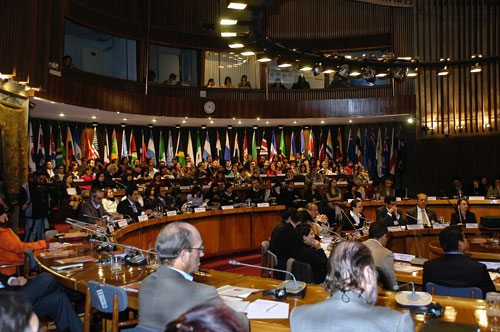Prioritizing Equality and Redefining Poverty is Imperative for a New Development Model
Topic(s)
Experts discuss proposals for measuring poverty beyond income levels, including aspects like access to basic rights and the loss of freedoms.

(13 May 2010) Redefining the way poverty is measured is imperative in a post-crisis context in which new perspectives on development and welfare are emerging, stated ECLAC Executive Secretary Alicia Bárcena during the inauguration this morning of the international seminar "Multidimensional poverty measurement in Latin America".
Participating in the seminar were Felipe Kast, Minister of Planning of Chile (Mideplan), Rodrigo Jordán, President of the Board of the Foundation for Overcoming Poverty (FSP), and Sabina Alkire, Director of the Oxford Poverty and Human Development Initiative (OPHI), institutions co-organizing the seminar along with ECLAC.
"Living in poverty does not involve just not having the income necessary to consume goods and services to cover basic needs; being poor also means suffering social exclusion. Ultimately, poverty is not being entitled to rights, the negation of citizenship," said Bárcena.
The multidimensional approach for measuring poverty - which has attracted increasing attention in recent years - includes aspects such as the deprivation of capabilities, loss of freedoms and lack of access to fundamental rights, in addition to the non-satisfaction of basic needs.
"Although poverty reduction in the region has been significant, Latin America and the Caribbean has the sad record of being the most unequal region in the world. It still exhibits alarming levels of absolute poverty," added Bárcena.
ECLAC studies indicate that between 2002 and 2008, poverty in the region dropped 11 percentage points, while extreme poverty decreased 6.4 points. However, 33% of the population in 2008 continued to live under the poverty line; 12.9% of them in indigence.
The document "Time for equality: closing old gaps, blazing new trails", which ECLAC will present during its Thirty-third session to take place 30 May-1 June in Brasilia, will suggest ways to address poverty reduction, among other issues.
Mideplan Minister Felipe Kast mentioned three areas that must be improved in order to arrive at an accurate diagnosis of poverty. In the first place, increasing the frequency with which poverty is measured, which in Chile is every three years. Secondly, counting with internationally comparable instruments for measurement and evaluation. And lastly, establishing minimum requirements in assessing the effectiveness of social policies in changing people's quality of life.
"When we discuss going from looking only at income to a multidimensional approach, what we are doing is evaluating which social dimensions should be considered in terms of social welfare. But this discussion over how to measure poverty and define social welfare should go hand in hand with greater requirements and rigor in the way in which we evaluate our programmes and policies," stated Kast.
The seminar will conclude tomorrow. Panelists include the head of the Statistics and Social Indicators Unit at ECLAC, Juan Carlos Feres, OPHI Director Sabina Alkire, and Conchita D'Ambrosio, professor at Milano-Bicocca University, among other experts on poverty and social development.
See also:
For enquiries, please contact ECLAC's Public Information and Web Services Section. Email: dpisantiago@cepal.org; telephone: (56-2) 210-2040/2149.
Related content
Seminario internacional Medición multidimensional de la pobreza en América Latina
Por Alicia Bárcena, Secretaria Ejecutiva de la CEPAL
Contact
Public Information Unit
- prensa@cepal.org
- (56 2) 2210 2040